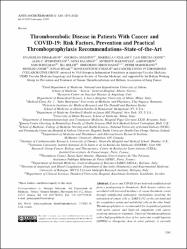| dc.contributor.author | Dimakakos, Evangelos | |
| dc.contributor.author | Gomatou, Georgia | |
| dc.contributor.author | Catalano, Mariella | |
| dc.contributor.author | Olinic, Dan-Mircea | |
| dc.contributor.author | Spyropoulos, Alex C. | |
| dc.contributor.author | Falanga, Anna | |
| dc.contributor.author | Maraveyas, Anthony | |
| dc.contributor.author | Liew, Aaron | |
| dc.contributor.author | Schulman, Sam | |
| dc.contributor.author | Belch, Jill | |
| dc.contributor.author | Gerotziafas, Grigorios | |
| dc.contributor.author | Marschang, Peter | |
| dc.contributor.author | Karahan, Oğuz | |
| dc.date.accessioned | 2023-10-02T06:32:47Z | |
| dc.date.available | 2023-10-02T06:32:47Z | |
| dc.date.issued | 2022 | en_US |
| dc.identifier.uri | https://www.scopus.com/record/display.uri?eid=2-s2.0-85133288196&origin=resultslist&sort=plf-f&src=s&nlo=&nlr=&nls=&sid=20c4fe371b9b908d4f7e419f791331ff&sot=aff&sdt=cl&cluster=scofreetoread%2c%22all%22%2ct&sl=72&s=AF-ID%28%22Alanya+Alaaddin+Keykubat+University%22+60198720%29+AND+SUBJAREA%28MEDI%29&relpos=49&citeCnt=4&searchTerm= | |
| dc.identifier.uri | https://hdl.handle.net/20.500.12868/2357 | |
| dc.description.abstract | Cancer and COVID-19 are both well-established risk factors predisposing to thrombosis. Both disease entities are correlated with increased incidence of venous thrombotic events through multifaceted pathogenic mechanisms involving the interaction of cancer cells or SARS-CoV2 on the one hand and the coagulation system and endothelial cells on the other hand. Thromboprophylaxis is recommended for hospitalized patients with active cancer and high-risk outpatients with cancer receiving anticancer treatment. Universal thromboprophylaxis with a high prophylactic dose of low molecular weight heparins (LMWH) or therapeutic dose in select patients, is currently indicated for hospitalized patients with COVID-19. Also, prophylactic anticoagulation is recommended for outpatients with COVID-19 at high risk for thrombosis or disease worsening. However, whether there is an additive risk of thrombosis when a patient with cancer is infected with SARSCoV2 remains unclear. In the current review, we summarize and critically discuss the literature regarding the epidemiology of thrombotic events in patients with cancer and concomitant COVID-19, the thrombotic risk assessment, and the recommendations on thromboprophylaxis for this subgroup of patients. Current data do not support an additive thrombotic risk for patients with cancer and COVID-19. Of note, patients with cancer have less access to intensive care unit care, a setting associated with high thrombotic risk. Based on current evidence, patients with cancer and COVID-19 should be assessed with well-established risk assessment models for medically ill patients and receive thromboprophylaxis, preferentially with LMWH, according to existing recommendations. Prospective trials on well-characterized populations do not exist. © 2022 International Institute of Anticancer Research. All rights reserved. | en_US |
| dc.language.iso | eng | en_US |
| dc.relation.isversionof | 10.21873/anticanres.15815 | en_US |
| dc.rights | info:eu-repo/semantics/openAccess | en_US |
| dc.subject | Anticoagulation | en_US |
| dc.subject | CAT | en_US |
| dc.subject | COVID-19 | en_US |
| dc.subject | Review | en_US |
| dc.subject | Thromboprophylaxis | en_US |
| dc.title | Thromboembolic Disease in Patients With Cancer and COVID-19: Risk Factors, Prevention and Practical Thromboprophylaxis Recommendations–State-of-the-Art | en_US |
| dc.type | article | en_US |
| dc.contributor.department | ALKÜ, Fakülteler, Tıp Fakültesi, Cerrahi Tıp Bilimleri Bölümü | en_US |
| dc.identifier.volume | 42 | en_US |
| dc.identifier.issue | 7 | en_US |
| dc.identifier.startpage | 3261 | en_US |
| dc.identifier.endpage | 3274 | en_US |
| dc.relation.journal | Anticancer Research | en_US |
| dc.relation.publicationcategory | Makale - Uluslararası Hakemli Dergi - Kurum Öğretim Elemanı | en_US |


















